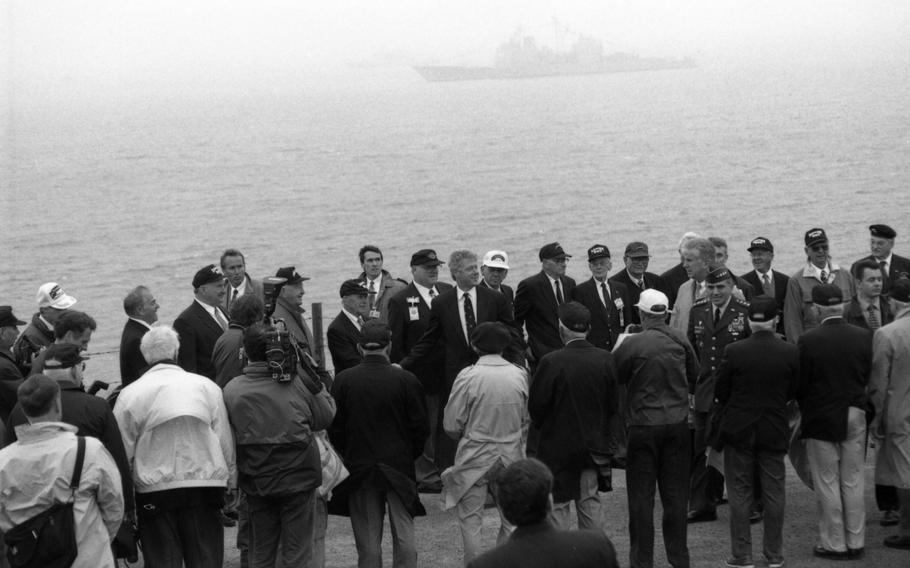
President Bill Clinton talks to D-Day veterans at the ceremony commemorating the D-Day landing at Pointe du Hoc, France, near Omaha Beach. The gathered crowd included many U.S. Ranger veterans who scaled the 100-foot cliffs to knock out the German artillery overlooking the landing beaches. (Ken George/Stars and Stripes)
In the months and days leading up to the 80th Anniversary of D Day, Stars and Stripes will be republishing a number of articles, as reported by its staff writers at the time. This article first appeared in the Stars and Stripes London edition, June, 12, 1944. It is republished unedited in its original form.
WITH THE AMERICANS IN FRANCE, June 9 (delayed) — This is the story of a village and the men who took it, a detachment of Rangers whose deeds put them right at the top of the class of American fighting men.
The village juts out from Hitler’s Atlantic Wall and dominates the coast. Casemated on the point were six Herman 55mm. guns, capable of keeping transports well out to sea. They had to be knocked out at any costs. The Rangers were given a job.
Prior to D-Day the village took a terrific bombardment from the air. Just hours before the landing ships of the Allied navies came in close and took up where the air forces left off. But it was impossible to tell just how effective the bombardments had been. The Rangers had to make sure.
Nothing could stop them
At H-hour the LCA’s touched down and the Rangers scrambled ashore. German machine-gunners and snipers opened up, but the men started scaling the 100-foot cliffs as if this were just another maneuver. The Germans on top rolled hand grenades down the slopes, they tried to cut toggle lines, they threw everything they had at those men coming at them – but they didn’t stop them. In little groups of twos and threes they scrambled over the top and went to work.
Meanwhile, down on the beaches those who were waiting their turn to go up the cliffs brought ashore all the ammunition and water they could carry.
And when all the Rangers reached the top, those who could set up a command post and found out the cover of area. Two of the enemy guns had been blown to bits by bombardment. The other four had been taken away. And missing were the men whose specific task it had been to get the four remaining guns. For two days and two nights and part of the third day those Rangers dug in and held their little triangular area. Sometimes they were pinned down in the point itself with the sea on three sides and the Germans to the front. They were low on water and food. Their ammunition was rationed. Their only weapons were rifles and two mortars. At night they crouched in their foxholes and peered into the night, waiting for the attack they knew was coming.
Rangers parry and retreat
The Germans left no doubt about their attacks. They gathered themselves in large groups and started with a lot of shouting. When they began their advance they came forward under a streaming curtain of fire. The Rangers waited for them. They retreated slowly, keeping contact and preserving their perimeter. And when Jerry fell back they moved up again.
The Rangers had one potent weapon — the American Navy lying just off shore. Aching to shoot was a destroyer that took targets from the ranger GP. Whenever the Germans tried to concentrate any sizable body of men, the destroyer opened up and chased them away. And as they left their positions the Rangers cut them down with rifle fire.
On the second day, an assault craft came into what the Rangers were now calling “Little Bataan.” It brought water and food and what the Rangers wanted most of all—ammunition. It took away those wounded who were too badly injured to fight—men who could still hold a gun refused to be evacuated.
On the morning of the third day the Rangers were ready for a finish fight. They had radio contact with American forces coming up on the flank, but the reinforcements were having their troubles, too. There didn’t seem to be much chance of their breaking through.
Lost patrol gets back
But they did get through and the Germans high-tailed it out of there. And the night after they left, the 16 men who had been sent after those four remaining.’ enemy guns rejoined their mates. They had found the guns, which now were no longer of further use to the Vaterland. This was their story:
The guns had been moved two miles inland. Lt. George Kercher, of Baltimore, Md., followed the fire tracks until he and his patrol saw the pieces getting into position. They drove the Germans away with rifle fire, then dashed in and threw Thermite grenades down the barrels, wrecked the breech blocks and scattered spare parts all over.
Just as the job was completed, the Germans counter-attacked the patrol, which hit a ditch and stayed there for 58 hours without moving. They had only three bars of chocolate between them, and very little ammunition. A constant watch “ was kept to insure that no sleeping man snored and gave their positions away. The Germans had them completely surrounded.
In addition to Lt. Kercher, men who spiked the guns included the following: 1/Sgt. Leonard Lomell, Pt. Pleasant, N.J.; S/Sgt. Larry Johnson. Baltimore; Sgt. Jack Kuhn, Altoona, Pa; Sgt. Joe Flanagan, Somerville, Mass.; S/Sgt. Lester Arthur, Akeley. Pa.; T/5 Gordon Lunning, New York; Pvt. Harry Fate, Mt. Pleasant. Mich.; Pvt. Robert Carty, Los • Angeles; S/Sgt. Emery Jones, Georgia; Pvt. Melvin Sweeney, Indiana; Pvt. Joe Hoover, Scranton, Pa.: Pvt. Robert Austin, North Carolina; T/5 Harley Huff, South Bend, Ind., and Sgt. Richard McLaughlin. Peoria, III.